Jack Charlton: In his own words and the stories of others
Last updated on .From the section Football
Football has lost another great with the death of England 1966 World Cup winner and former Republic of Ireland manager Jack Charlton.
As well as his skill on the field, Charlton was known for his plain speaking off it.
BBC Sport looks back at some of the greatest stories about the man known affectionately as 'Big Jack'.
Fear of failure
Born in the Northumberland town of Ashington, both Jack and his younger brother Bobby knew football was a means of escape from working in the local coal mines.
Jack had been offered a trial with Leeds United as a 15-year-old but instead briefly joined his father in the pit. He applied to join the police but was given another chance by Leeds, which he took, and joined the club's ground staff before being given a contract aged 17, prior to doing National Service with the army.
"When the lads had gone away to play football, if they didn't succeed and had to come back, it was like a disgrace, they had failed," he told presenter Sue Lawley when he appeared on the BBC's Desert Island Discs in 1996.
- Jack Charlton on Desert Island Discs
- Football Daily: 'He was a natural leader' - a tribute to Jack Charlton
"I didn't want to go away and fail. I think that was probably the reason. I didn't think I would make it, I didn't think I was going to be good enough."
The Revie influence
Don Revie, who managed Charlton at Leeds, was a key figure in his football career. He revolutionised the way clubs trained and he was the one who convinced a sceptical Charlton he had international potential.
"When he first got the job, he said to me: 'You've got enough ability, if you were to screw the nut and do the job right, you could play for England'. I said, 'Don't be stupid'. I'd never seen myself in that light at all."
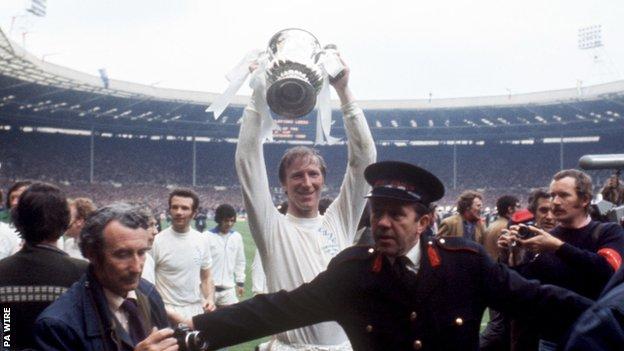
Leeds went on to win the 1969 league title and the 1972 FA Cup but, despite his reputation for tough tackling, Charlton denied he was a dirty player.
"If someone did something really nasty to you, and I mean really nasty, the kind of thing that needed to be taken out of the game - I'd get them back if I got the chance but I would do it within the laws of the game when the ball was there," he once said.
"People ask me who was in the little black book, and I say there was nobody. I just had a good memory of people who'd done nasty things to me."
Celebrating a World Cup win
Charlton was almost 30 when he made his England debut in 1965 and a year later, along with his brother, was part of the team which beat West Germany to lift the Jules Rimet Trophy.
After Geoff Hurst's hat-trick goal which sealed the 4-2 victory at Wembley, Charlton recalled that he ran the whole length of the field just to get hold of him.
"As I came near to him, he ran off and I was too knackered to follow," he said.
"I flopped to my knees, totally exhausted, and my head fell forwards onto my hands. I don't remember saying a prayer - I probably just said something like, 'Thank the Lord that's over'."
After the team celebrations at the Royal Garden Hotel, Charlton ended up sleeping on the floor of a random couple's house in north London, but one woman certainly wasn't impressed by his antics.
He remembers: "I got a lift back the following morning and my mother was playing hell as I hadn't been to bed all night. I said, 'Mother, we've just won the World Cup!'"
Outdoor pursuits
Away from football, shooting and fishing were Charlton's passions
He starred in his own TV series - Go Fishing with Jack Charlton - in the 1970s and later put his name to a computer game, Jack Charlton's Match Fishing.
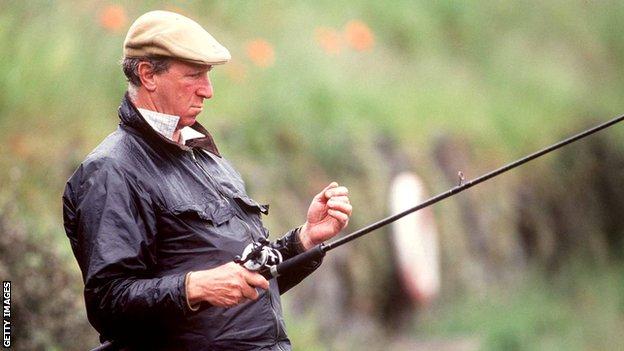
Even when he took over as Newcastle manager in 1984, nothing was going to stop him indulging in his interests.
After a heavy midweek defeat by Arsenal, Charlton announced to the team he'd see them next on Saturday at Old Trafford.
"I'm off grouse shooting," he announced to the bemused dressing room which included the likes of Peter Beardsley and Chris Waddle.
And true to his word, the next time the Newcastle players saw their manager was when he came into the dressing room at 1.45pm on Saturday.
Meeting the Pope
Although his appointment as Republic of Ireland manager was not universally welcomed, Charlton won the hearts of the Irish people as his side reached their first major tournament - Euro 88 - before qualifying for their first World Cup finals in 1990.
Before the Republic's quarter-final against Italy in Rome in 1990, the team were granted an audience with Pope John Paul II at the Vatican.
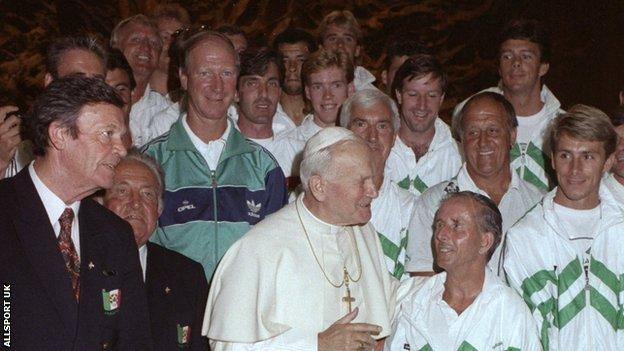
"I thought we'd go into a room, he'd come in and bless the lads and say a few prayers and we'd take some photos," Charlton said in an interview.
"But the audience chamber holds 7,000 and there were people from all over the world there."
The lengthy ceremony took its toll on Big Jack who was trying (and failing) to stay awake.
"The Pope was on the third bit of his blessing and he was looking right at me. I thought he was waving at me so I stood up and waved back."
No joy for Bonner
The Pope was a notable goalkeeper in his youth in Poland and at the audience had a special chat with Republic of Ireland keeper Pat Bonner.
However, in the quarter-final, Bonner was beaten in heartbreaking fashion by Toto Schillaci as the Italians advanced to the last four.
After the game at the Olympic Stadium, Charlton thanked his players for their efforts and told them to go and enjoy the holidays, but there was little comfort from Charlton for his devastated keeper.
"Oh and by the way Packie, the Pope would have saved that!'"
Who are you?
Jack's inability to remember names was legendary.
For the 10 years Paul McGrath played under Charlton for the Republic of Ireland, he was known to the manager as James. And McGrath answered to his new name.
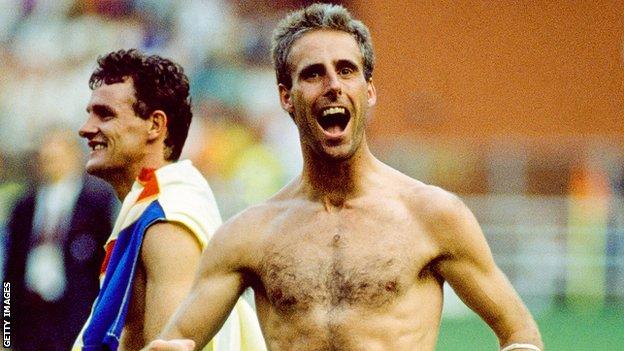
His own players and opposition players were described vaguely as 'your man', 'the big man' or 'him over there'.
During a game against the Netherlands, Mick McCarthy was given instructions to "stay tight on Van Cleef".
McCarthy told the boss that Lee van Cleef was a dead Hollywood film star.
World Cups and waterparks
It might be unorthodox by today's standards but Charlton's management of his players worked.
Two days before the 1990 World Cup quarter-final against Italy, there was a drinking session involving a Guinness truck with players enjoying themselves and Charlton in the middle of it.
"If he saw someone drinking a Coke, he'd say, 'What are you drinking that **** for? Guinness is better for you'," said striker John Aldridge.
Four years later at the 1994 finals in the US, players relaxed in Orlando by visiting the waterparks - with the blessing of their manager
Roy Keane, who was part of the squad, remembered: "If you saw a player doing that now you'd say, 'That's a bit mad', but it was a great way to switch off.
"When you're going down a slide in Orlando, you're not thinking about a Mexican midfielder who is supposed to be playing against you.
"Jack always had a relaxed attitude - when you were not training, you lads, you do what you want.
"A lot of lads were experienced players who had the balance right - we went to have a few pints and we went to relax."
Cheque, mate
Much loved in Ireland, it was a commonly-held belief for some time that Charlton paid his bar bills by cheque in the knowledge that publicans and restaurants would not cash the cheque, instead framing it on the walls of their establishments.
But in an interview with the Guardian in 2004, Charlton dispelled that myth.
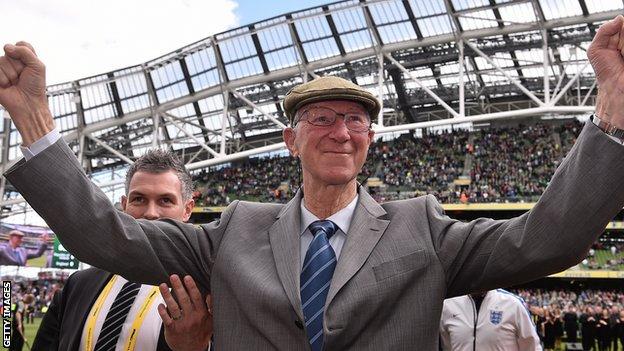
"It's not unusual for me to be standing at a bar and a pint of beer will appear in front of me, and I've already got one," he said.
"Or I go to pay my bill and it's already been taken care of.
"That happens and the Irish are very, very generous people, but that cheque story is just wrong."





















